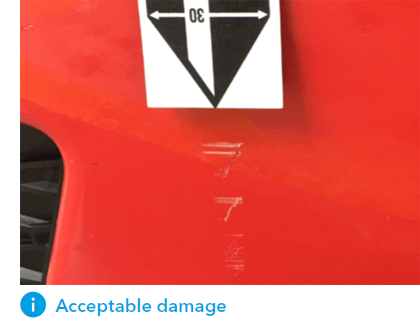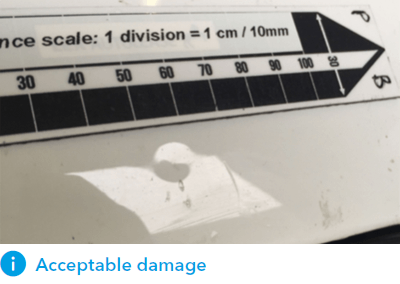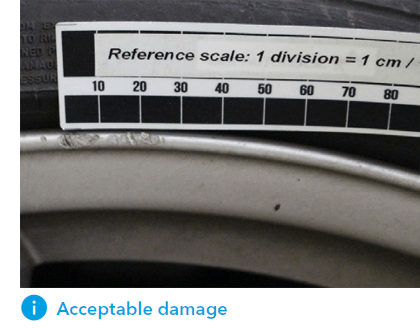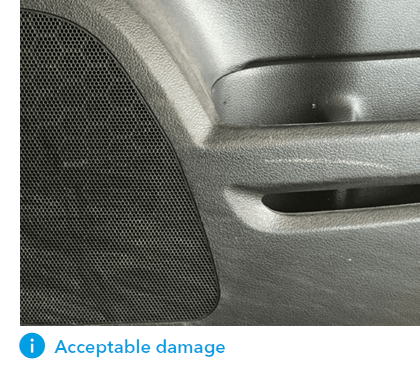Go paper-free
Amend paper-free preferences for your statements and communications.
Fair wear and tear occurs when normal use causes acceptable deterioration to the vehicle’s condition at the end of a contract or finance agreement. The age, mileage and use of the vehicle are taken into account.
We suggest you check your vehicle 10-12 weeks before it’s due for return. This will give you time to arrange to have any unacceptable wear and tear repaired. But don't forget to:
End of contract charges occur when the vehicle and its equipment or accessories are not maintained, looked after, or used as originally agreed at the start of the contract.
You may find it cheaper to make your own repairs before we collect the vehicle. You will be responsible for the standard of those repairs, set out in this good condition guide.
When returned to us, your vehicle will be checked by a qualified inspector for any damage over and above normal wear and tear. We will then tell you of any damage that falls outside of fair wear and tear standards and give you a costed inspection report. Any excess mileage and damage charges need to be paid within 30 days of that report.
Your vehicle must be fully serviced in line with the manufacturer and/or warranty requirements. Any mismatched colours and parts, or substandard repair work will not be accepted. Additions you have made to the vehicle can be returned to you if you ask us in writing. Our reasonable costs, which may include replacing any items and repairs to damage caused, need to be paid to do this.
You will need to return the complete servicing record. You will also need to return any items or documents that came with your vehicle, such as the vehicle registration certificate and spare keys. If you don't have any of these, the value of the vehicle may be reduced and you may be charged the cost to replace them.
Please make sure these items are placed in the vehicle or there may be a charge:
Please check for and remove all personal items from the vehicle such as phone kits, portable Sat Navs, trackers, parking permits, CD ’s, etc. All personal data you may have stored in vehicle systems also needs to be deleted. For example, clear destination details from built in Sat Navs, wipe phone contact lists and call logs from in-car phones and remove all music uploaded to onboard music systems. And make sure all personal memory cards or drives are removed.
Here's what we'll take into account when assessing the condition of your vehicle:

Acceptable condition
The vehicle should be returned in a safe, legal and reliable mechanical condition, capable of passing an MOT test.
Not acceptable
Acceptable Condition
Any repairs made to the vehicle as long as they meet our good condition guidelines. You will be responsible for the standard of the repairs.
Not acceptable


Acceptable condition
Scratches and abrasions up to 25mm, where the primer or bare metal is not showing.
Not acceptable
Scratches down to the primer or to bright-work/moulding. Panels that require respraying will incur end of contract charges.
Acceptable condition
Dents up to 10 mm in diameter, as long as the paint surface is not broken.
Not acceptable
Dents on the roof or grooved metal line on any of the panels.


Acceptable condition
Small areas of chipping, including door edge chipping, as long as the base coat has not been penetrated.
Not acceptable
Areas of chipping which require the entire panel, bumper or trim to be repaired or repainted.
Acceptable condition
Not acceptable

Acceptable condition
All tyres including the spare must be within legal limits. The minimum legal tread depth for a car tyre is 1.6mm, which must be maintained across the central 3/4 of the breadth of the tread in a continuous band for the full circumference of the tyre.
Not acceptable
Damage to sidewalls or tread and uneven wear due to under or over-inflation.
All heating elements should work properly.
Acceptable condition
Light scratching provided it does not interfere with the driver’s line of sight.
Not acceptable
Chips and any critical damage. Cracks or holes should be repaired immediately and to a professional standard.
Adjustable and/or heated door mirrors should work correctly.
Acceptable condition
Minor scuff marks or scratches up to 25mm to door mirrors.
Not acceptable
Missing, cracked or damaged door mirrors. These should be replaced.
All lamps and lenses must work.
Acceptable condition
Minor scuff marks or scratches up to 25mm.
Not acceptable
Holes or cracks in the glass or plastic covers of lamp units. These should be replaced.
Interior fittings should be present, intact and free of damage.
Acceptable condition
Normal wear and tear to carpets and trims.
Not acceptable

The spare wheel (including ‘spacesaver’), jack and other tools must be intact, stowed properly and in good working order. The emergency tyre inflation kit, if supplied when new, should be in full working order, serviceable and ready for use.
Not acceptable